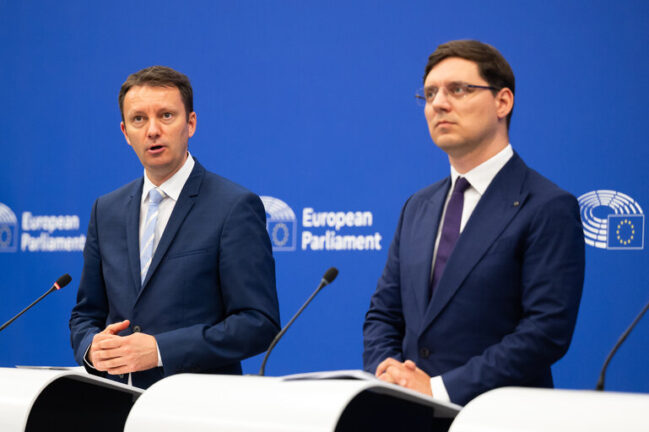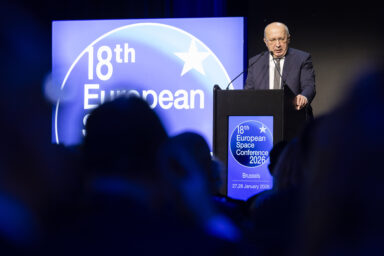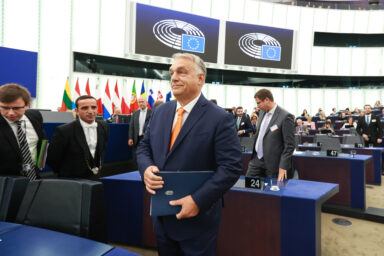The European Parliament took stock of one of the most ambitious experiments in EU integration to date: the Recovery and Resilience Facility (RRF), a €723bn fund set up to revive European economies post the coronavirus pandemic. As the August 2026 deadline for project implementation looms, MEPs have called for an 18-month extension.
The Parliament adopted the implementation report on the RRF last week. The report comes from the Committees on Budgets (BUDG) and Economic and Monetary Affairs (ECON), with 421 votes in favour, 180 against, and 55 abstentions. It welcomes the RRF’s stabilising effect and calls on the European Commission to allow for the completion of ongoing projects by February 2028 instead of August 2026.
Rapporteurs of the report, MEPs Victor Negrescu (S&D/RO) and Siegfried Mureşan (EPP/RO), hailed the RRF as a “historic European achievement” and a “symbol of solidarity”. They noted that “never before has the EU mobilized €700 billion in such a short time.” Mr Mureşan stressed that the funds played a crucial role in sustaining the vitality of the private sector, “which kept on investing, knowing that financial support from Europe would be coming. It was Europe at its best.”
Accountability Gap
But with only a year to go before the deadline passes, only around 28 percent of project have reached fill completion, and more than €300bn remains to be disbursed. As it stands, many member states risk losing out on the funds. Mr Negrescu wants to avoid this: “We must stand by citizens and fight for the finalization of essential projects,” he urged.
(Private sector) kept on investing, knowing that financial support from Europe would be coming. It was Europe at its best. – MEP Siegfried Mureşan
Despite its ambitious aims, the rollout of the RRF has seen its fair share of problems. Earlier this year, the European Court of Auditors (ECA) published a highly critical report, stating that “the size and speed of the fund have outpaced national administrations’ ability to monitor it effectively.” The auditors described the lack of oversight, particularly in public procurement, as a “persistent problem”. In 2023, the ECA also raised concerns about the unclear link between project financing and tangible results.
MEP Markus Ferber (EPP/GER) argued that, for these reasons, the RRF “can neither serve as a blueprint for future EU programmes, nor does an extension make sense.”
In the initial implementation phase of the RRF, the European Commission focused narrowly on preventing fraud, corruption, and conflicts of interest. Only later did it begin checking whether the funds were being spent as intended, and whether that spending violated EU state aid rules. In practice, countries received little guidance on how to implement effective controls.
You might be interested
Fraud concerns
This has sparked concerns across many European capitals, with lawmakers pointing to more than 200 ongoing RFF-related fraud investigations, primarily in Italy, by the European Public Prosecutor’s Office (EPPO). Northern European countries, in particular, have seen growing sentiment that financially stronger member states are footing the bill for mismanagement elsewhere.
MEP Alexander Jungbluth (ESN/GER) described the RRF as “fiscal madness,” accusing Brussels of using covid-19 as a pretext for establishing permanent joint debt. “What does the financing of solar panels for property owners in Southern Europe have to do with the coronavirus? Right, absolutely nothing. But nevertheless, such measures were financed by the RRF, 100 per cent tax-financed,” he said.
Dutch MEP Dirk Gotink (EPP) expressed similar concerns, warning that “European citizens are getting a mountain of debt in return.” While the Netherlands may receive up to €5bn, he noted, it will have paid over €35bn by 2058.
Implementation lagging behind
Meanwhile, implementation has lagged behind expectations. As of April 2024, only €225bn had reached the destinations, far below the RRF’s €723bn headline figure. Spain, for example, had received just €340m of its potential €83bn in loans.
Critics argue that the delays are due to overly stringent conditions. Member states must submit detailed recovery plans outlining the use of the money and what reforms to enact, often touching on sensitive areas such as pension systems or judicial independence. In Italy’s case, for example, access to RRF funds became contingent on adopting a law requiring companies to accept electronic payments, a long-standing demand from Brussels aimed at curbing tax evasion.
Hungarian MEP Enikő Győri (PfE) denounced what she called the “politicization of the recovery funds” and criticized the Commission’s withholding of Hungary’s share of the RRF. Ms Györi claims that the Commission is unjustly punishing the Hungarian people “for holding traditional values.” The Union has frozen funds for Hungary due to concerns over the lack of judicial independence and rule of law under Viktor Orbán’s government.
The ideal of European solidarity as reality
Still, many MEPs stress that despite the RRF’s flaws, its positive impact is undeniable and should be seen as a historic moment of European solidarity.
MEP Jean-Marc Germain (S&D/FR) said: “This momentum enabled us to overcome the pandemic, to make the ideal of European solidarity a reality, to protect our economies and jobs, and to accelerate the ecological and digital transition. So let’s not learn the wrong lessons from this experience.” Sandra Gómez López (S&D/ES) echoed that sentiment, calling the RRF “the most ambitious proposal for European solidarity and cohesion since the creation of the euro.”
What’s next?
While Parliament may push for more flexibility, any extension of the RRF would require the Commission to formally take up its resolution and propose a change to the regulation. So far, the Commission does not appear particularly enthusiastic. Rather than extending deadlines, it seems to focus on accelerating implementation and finding creative ways of spending the remaining funds.
“Member states need to review their plans urgently, and to remove any measures that are no longer feasible,” said Economy Commissioner Valdis Dombrovskis in May. He shares responsibility for the implementation of RRF with Cohesion Commissioner Raffaele Fitto, whose party, Fratelli d’Italia, supports an extension.
Even if the Commission were to act on Parliament’s resolution and put forward a proposal to extend the RRF, it would require unanimous approval in the Council. Ratification by all national parliaments—a tall order in a divided Union—would have to follow.
Earlier this month, the Commission also confirmed that member states can now also redirect unspent RFF funds to defense-related projects.











